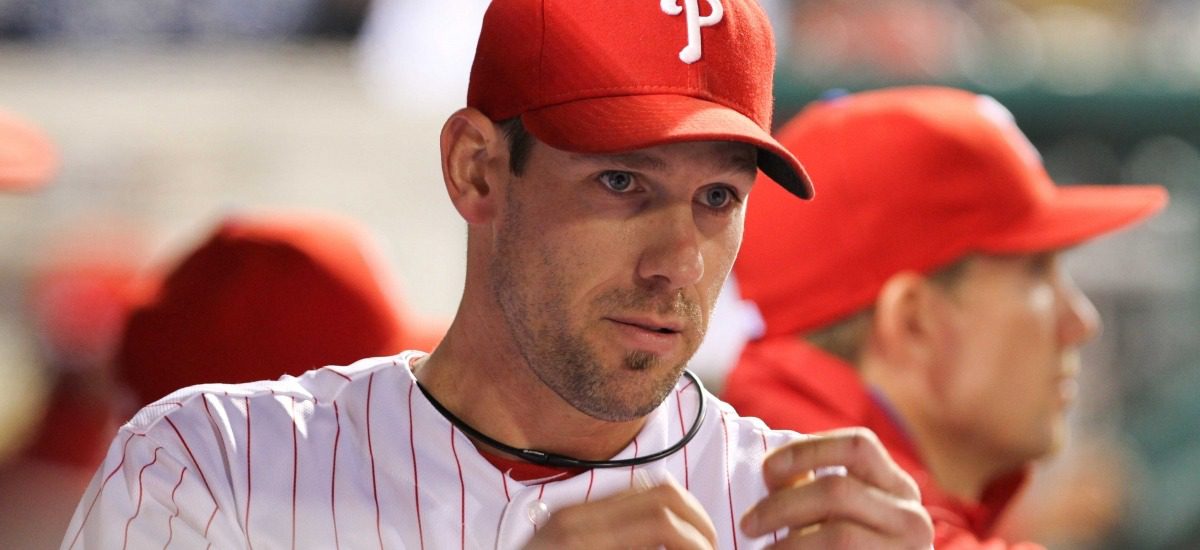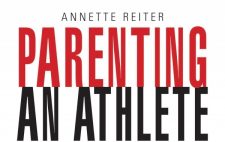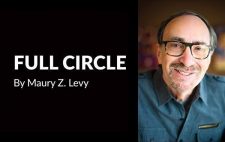By almost every measure, the remaining fans should have been sparse as the night of June 28 drew to a close. First of all, there was the heat. The air inside Citizens Bank Park was humid and heavy as a blanket. Mosquitos and gnats gathered around the stadium lights like pixelated clouds, and the lingering brow sweat of the ballplayers could be seen even from the 400 level.
Then there was the score. Going into the top of the ninth inning the Phillies led the Boston Red Sox 5-0, and what remained was an all but technical finish to a matchup that had been thoroughly dominated by the red and white all evening. As the last batter for Beantown stepped up to the plate – with two outs and nobody on – you might have been inclined to assume the majority of Tuesday night’s crowd was long headed home to SJ or the city’s suburbs. Instead, a sold-out crowd of more than 43,000 fans remained, standing in ovation as pitcher Cliff Lee prepared to make history.
With each pitch, the volume of Lee’s ovation swelled, churning like a jet engine; fan adrenaline feeding off itself, gaining strength and volume every time the ball sailed from the pitcher’s fingers into the muted thwap of Carlos Ruiz’s mitt behind home plate.
Strike one. Got him looking.
The cheers grew louder still. Fans stood even taller, showering one of the region’s most beloved ballplayers with the impossible overflow of their limitless adoration. They knew Lee was about to become historic that night, pitching his third straight complete game shutout and closing in on a 32-inning scoreless streak, topped only by legendary Phils pitchers Robin Roberts and Grover Cleveland Alexander. If Lee could just get that last batter out, Lee’s performance would mark the first time a Phillies pitcher blanked three starts in a row since Roberts did it in 1950.
Strike two. Got him swinging.
But that night was about more than just history in the making. The gathered fans were also cheering the promise Lee had fulfilled and the expectations he had so greatly exceeded.
Last December, Phillies general manager Ruben Amaro Jr. shocked the baseball world by snatching Lee – a free agent at the time – from the mighty arms of the New York Yankees, bringing Philly’s favorite adopted son back into the fold just 12 months after he had been in-gloriously traded away to the Seattle Mariners at the close of 2009. He was the final piece in a pitching rotation many had hailed as the greatest in modern baseball history. On that heavy, humid Tuesday night in late June, Cliff Lee had the weight of it all on his shoulders.
The batter lines out to third. Shutout number three in the record books.
Three weeks later, when I catch up with Lee inside the Phillies clubhouse an hour before game time, I ask him about that moment. The expectations. The fervor. The historic nature of the whole thing. I’m dying to know: What in the world was going through his mind at the time?
“Just trying to get the hitter out,” he says, the brow above his huckleberry eyes raised in a matter-of-fact, deferential furrow that turns the typically clichéd nonchalance of most professional athletes into something far more genuine. “It’s not that complicated. I know I’m one pitch from it being over, so I want to make sure I’m focused. To some people it might seem a little more complicated. But I just try to keep it simple.”
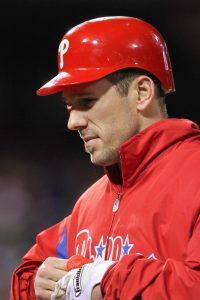 On the mound, Clifton Phifer Lee has earned a reputation as not only one of the most formidable pitchers in the game today, but also one of the most relaxed. It takes a Herculean effort for batters to rattle him even slightly. When he wins, Lee’s performance is usually a testament to a pitcher’s power – and burden – to influence the game’s tone, pace and score.
On the mound, Clifton Phifer Lee has earned a reputation as not only one of the most formidable pitchers in the game today, but also one of the most relaxed. It takes a Herculean effort for batters to rattle him even slightly. When he wins, Lee’s performance is usually a testament to a pitcher’s power – and burden – to influence the game’s tone, pace and score.
Consider that there is perhaps no position in all of professional sports that can induce more anxiety than pitcher, because the pitcher is entirely alone. Every time he steps from the dugout, he knows he is about to float adrift on the island of his dirt mound, 60 feet and six inches from home plate, bereft of consolation, and wholly dependent on the solitary strength of his composure. He alone dictates success, which is precisely why Lee loves his lonely perch.
“With pitching, you’re in control of everything that’s going on in the game,” says Lee, who, after ten seasons in Major League Baseball, is poised to finish 2011 as one of the greatest pitchers to ever don a Phillies uniform. “Obviously you need guys behind you to make plays and a good catcher behind the plate. But the pitcher has the ball, and nothing’s going to happen unless you want it to happen. And I like that. You’re controlling the pace, and if you’re on top of everything, you’re basically controlling everything that’s going to happen.”
Standing at an imposing 6-foot-3, Lee’s demeanor off the mound is just as measured and relaxed as it is on. His voice, which reveals faint, lilting traces of his Benton, Arkansas pedigree, is completely free of tension, affectation or bother. It’s the kind of voice you’d want to have beer with.
“He’s just such a quiet, calm, laid-back dude,” says Shane Victorino, Phillies center fielder. “It’s amazing. He’s so lackadaisical, and yet so successful. You can walk into the clubhouse five minutes before he’s about to pitch in a game, talk about whatever, have a good old time, and then he’ll go out onto the mound and boom! He’s locked in. Not all pitchers are like that.”
Amaro is well aware of Lee’s unique composure. As the club’s general manager, Amaro is in the business of assessing the subtler, nuanced qualities a player brings to the field and the clubhouse. In Lee, Amaro knows he’s got something special indeed, and it’s easy to see why he fought so hard to get him back last winter.
“He’s a very unselfish guy and a great athlete. And he doesn’t get rattled,” says Amaro during pre-game batting practice before a showdown against the San Francisco Giants. “He goes about everything with a steady confidence, and that’s what separates him. He’s a joy to be around.”
As one of the team’s most seasoned players, shortstop Jimmy Rollins has seen this particular group of guys evolve from a scrappy, upstart club to perhaps the most elite and envied team in baseball. That evolution has come not only by way of talent, but also a calculated fusion of character and personality. Lee, he says, fits in perfectly.
“He’s a straight shooter,” says Rollins. “What you see is what you get. Just like when he’s on the mound. You know what he’s going to do. And that fits here. There’s nothing hidden behind the curtain.”
This reputation is no secret to Lee, who refers to himself as a “laid-back, go-with-the-flow type of guy,” adding that the calm, unruffled stuff of his makeup is not only essential to his success in baseball, but critical to maintaining his sanity off the field as well.
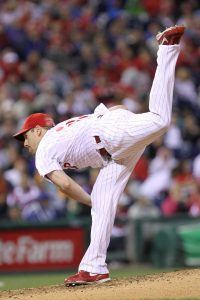 See, baseball is grueling in ways that compare to no other sport. Consider, for instance, the marathon length of a typical season. Players suit up for 162 games over the course of 180 days, traveling constantly and rarely enjoying a day off. Factor in spring training and the October post-season, and you’re looking at a concentrated commitment spanning eight months. Balancing this with his life outside the ballpark – which includes his wife Kristen, their son Jaxon, 10, and daughter Maci, 8 – Lee has to remain as relaxed as possible if he is to make it to that grand autumn finish line.
See, baseball is grueling in ways that compare to no other sport. Consider, for instance, the marathon length of a typical season. Players suit up for 162 games over the course of 180 days, traveling constantly and rarely enjoying a day off. Factor in spring training and the October post-season, and you’re looking at a concentrated commitment spanning eight months. Balancing this with his life outside the ballpark – which includes his wife Kristen, their son Jaxon, 10, and daughter Maci, 8 – Lee has to remain as relaxed as possible if he is to make it to that grand autumn finish line.
“It’s baseball just about every single day, and when it’s not I do a lot of sleeping, relaxing, and just spending time with the family at home,” says Lee, who lives in Philly’s Rittenhouse neighborhood and is often seen walking the streets and enjoying the region’s many attractions.
Lee also works with Holman Automotive in a unique charity initiative that relies on – that’s right – his pitching. For every batter Lee strikes out, Holman pay’s $150 to a Philadelphia-based charity for children. As of mid-September, Lee had 211 strikeouts, or $31,650 donated thus far.
“You just try to get as much rest as you can,” Lee says of his downtime. “It’s a long season and it’s not for everyone.”Neither is the Philadelphia region. Before coming here the first time in 2009, Lee says the city’s reputation had him a bit wary of the place.
“I had heard nothing but mostly bad things,” he says. “Heard that people are rude and the city’s run down and dirty. Stuff like that. But once I got here, I didn’t see any of that. We loved the area. Loved the city. It was the exact opposite of what I’d heard.”
When Lee came back to the Phillies in December, he wasn’t just coming back to any other pitching rotation. The team already had three aces in Roy Halladay, Roy Oswalt and Cole Hamels. This unprecedented concentration of talent, combined with the swift and immediate love affair fans had with Lee during his short but glorious tenure in 2009, caused the expectation level to swell to impossible magnitudes. Lee was to be the savior, the embodiment of the dream, the final cog in a pitching machine designed for one thing and one thing only – a 2011 World Series victory.
Did this concern him? Heck no. He’s Cliff Lee.
“I wasn’t too worried about the expectations, because I already had high expectations for myself. That’s why I signed here,” he says with a playful smirk and a shrug of the shoulders. “I thought it was the best chance for me to win a ring, and that’s my expectation. If you don’t have high expectations, what’s the point? Know what I’m saying? It doesn’t scare me or anything. It’s normal.”
Here Lee pauses for a moment, giving the matter a long, silent stretch of inward consideration. Looking around the clubhouse at his teammates, he continues.
“I think every player should come into spring training and look at their club and say, ‘Okay, we’re going to win the whole thing.’ If you don’t think that, what’s the point? Know what I’m saying? Expectations, to me, are nothing more than trusting in yourself and expecting to win and be the best. At the highest level, if you’re thinking anything else, you’re already beat.”
Since Lee’s return, speculation on the relationship between him and the other aces has also been the stuff of much water cooler rumination. How much do they compete with one another? How much do they learn from one another? And how well do they get along with one another?
“There are no cliques on this team,” Lee says. “There’re no egos. No one thinks he’s better than anyone else. And that goes for the pitching staff, too.”
And while he admits that the club’s four legendary pitchers do sometimes exchange advice, he also says the interaction is more casual than most fans might think.
“I think a lot of people assume we’re just quizzing each other all the time and asking each other questions. That’s not how it works,” he says. “I don’t have to ask them. I can watch them and pick up on it for myself. I mean, I do ask questions, but not to the extent that you might think.”
That, once again, brings Lee back to the serenity of his style and the correlation between his personality and the aesthetic of his pitching. “For Cole and Halladay, they go into a game watching a lot of video and with a more extensive plan. That fogs things up for me. Makes it too complicated. I make adjustments on the fly,” says Lee. “Sometimes I think the more complicated you try to make it, the more complicated it becomes. The simpler you make it, the simpler it becomes.”
Which may be one of the reasons he gets along so well with Charlie Manuel. When he first took the helm in 2005, Manuel’s Appalachian accent, bumbling press conferences and quotes that made Yogi Berra sound like Shakespeare gave many fans the impression the city had inherited a rather unimpressive dolt. But six years later – with a World Series victory under his belt – what once may have been mistaken for ineptitude has shown itself for what it really is: brilliant simplicity.
“Oh, he definitely knows baseball,” Lee says of Manuel. “He takes the time to get to know each and every guy, and how to push each player’s buttons. He’s always in the clubhouse, making his rounds and talking to each of the players. And he and I get along well.”
With less than 30 minutes to game time, I ask Lee the question I try to ask any athlete: Why this sport?
“I think I probably could have played anything,” he says. “I’m an extremely competitive person, whether shooting pool or throwing darts. I want to win. And I’m gonna keep doing it over and over again until I do win. This just happens to be what I’m best at, so it’s a natural fit. If I had been better at basketball I would have done that too – anything to compete. But this is what I love. I love playing baseball. I’d rather be doing this than anything else. And I think that makes it easier. And I’m good at it. It’s what I think I’m supposed to do.”

